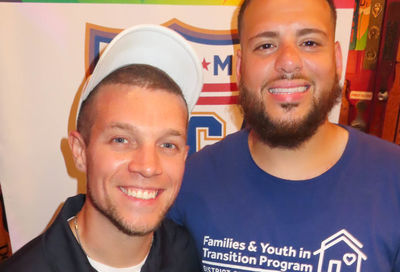Torturous anal exams to “prove” homosexuality still being used in some countries
The use of forced anal examinations to prosecute men suspected of being homosexual persists in some countries

It’s been condemned by the United Nations as a form of torture, has its roots in a nearly two-century-old medical myth, and has been rejected by generations of physicians. But the use of forced anal exams on men suspected of receiving anal sex shows no signs of abating. Despite overwhelming evidence against the destructive practice and growing criticism of its use, some countries continue to subject men to it regardless. Why? To prosecute them for homosexuality.
As part of the examinations, which often occur after neighbors or relatives of the accused report their suspicions to the local authorities, subjects are arrested and taken to hospitals. Once there, doctors penetrate their rectums with fingers and often other objects, allegedly to determine the tone of the anal sphincter. But even worse than the treatment that the men receive is that these “tests” are based on junk science — any evidence gathered through the examinations is specious at best.
The root of anal examinations to determine homosexuality comes from a now-discredited theory promulgated in 1857 by Auguste Ambroise Tardieu, a French forensic doctor. Tardieu published a paper, “Forensic Study of Assaults Against Decency,” which alleged that there were six signs that would point to whether a man had engaged in receptive anal sex. Some of those signs included well-developed buttocks, a “funneling” of the tissue around the anus, and even the presence of fistulas or hemorrhoids.
“These are ideas that were very quickly discredited by other European forensic specialists,” says Neela Ghoshal, a senior LGBT rights researcher for Human Rights Watch, a nonprofit organization that monitors and fights against human rights abuses across the globe. “The next generation of forensic doctors completely discarded this idea, because it wasn’t based on any actual studies. It was just theorizing. But in the meantime, this theory made its way to Egypt. And somehow, from there, the idea spread to other parts of the world.”
Ghoshal says it’s unclear why the practice took root in some nations, but not in others. There’s also no religious link, as the known practitioners are essentially split in half between Christian- and Muslim-majority nations. One commonality is that most of the countries in question typically enforce their homosexuality laws with some regular degree of frequency, most notably Egypt, where nearly every person arrested for “debauchery” has been taken to the Forensic Medicine Authority, which is part of the country’s Ministry of Justice. However, Ghoshal notes that there are some exceptions to that rule, such as Kenya, which has very few prosecutions of homosexuality yet had a prominent case last year where anal exams were used against two men in 2015.
“That particular case, the police caught two guys. There was a particular scandal related to pornography,” Ghoshal says. “They were looking for scapegoats. They were under pressure to come up with some way to nail these guys, and my speculation is that police in Kenya had heard about the use of anal exams in Uganda, and thought, ‘There, we’ve got them. This is how we’re going to pin this on these guys.’ So I think there’s sometimes cross-pollination between neighboring countries.”
The two Kenyans have since brought a lawsuit challenging the constitutionality of anal exams, and are seeking a court ruling to stop the practice. That challenge is currently working its way through the courts.
Tunisia was another recent target of criticism, after the United Nations Committee Against Torture last week condemned their use of forced anal exams. But human rights advocates have reported incidents of similar tests being done on men suspected of homosexuality in at least five other countries in the past five years. Those countries are: Cameroon, Lebanon, Turkmenistan, Uganda and Zambia. There are also reports of the practice occurring in the United Arab Emirates, though there have been no known incidents since 2010.
Of those nations, Lebanon has come closest to stopping the practice. Lebanese grassroots activists, led by the group Legal Agenda, began an effective campaign that labeled anal exams as “tests of shame” and called their practice a form of rape. In 2012, due to their efforts, the country’s National Medical Council banned the use of anal examinations as evidence of homosexuality, which remains criminalized. The country’s Minister of Justice subsequently made a statement calling the practice a violation of human rights and calling on prosecutors to stop relying on them for convictions.
However, the decision of whether to order an anal exam is often left up to the discretion of individual prosecutors. And, Ghoshal notes, there have been cases where police have instead traded anal exams for another form of torture: beating people severely until they confess to being homosexuals.
In addition, eliminating anal exams in these countries would not end prosecutions for homosexuality, Ghoshal warns. Even in cases where anal exams have not been performed, LGBT people have been convicted on circumstantial evidence such as photos, text messages, conversation or witness testimony that is often speculative. In one of the more egregious cases out of Cameroon, the prosecutor claimed that the fact that two men had been drinking Bailey’s, dubbed a “woman’s drink,” was evidence that the men were homosexual.
“When you have courts that don’t really care if objective evidence is there to convict someone, or the courts are influenced by homophobic beliefs, it’s very difficult to rely on the end of anal exams to eliminate homosexuality prosecutions altogether,” says Ghoshal. “But basically what it would do is take one tool out of their arsenal, to make the prosecution that much more difficult.”
Support Metro Weekly’s Journalism
These are challenging times for news organizations. And yet it’s crucial we stay active and provide vital resources and information to both our local readers and the world. So won’t you please take a moment and consider supporting Metro Weekly with a membership? For as little as $5 a month, you can help ensure Metro Weekly magazine and MetroWeekly.com remain free, viable resources as we provide the best, most diverse, culturally-resonant LGBTQ coverage in both the D.C. region and around the world. Memberships come with exclusive perks and discounts, your own personal digital delivery of each week’s magazine (and an archive), access to our Member's Lounge when it launches this fall, and exclusive members-only items like Metro Weekly Membership Mugs and Tote Bags! Check out all our membership levels here and please join us today!

























You must be logged in to post a comment.